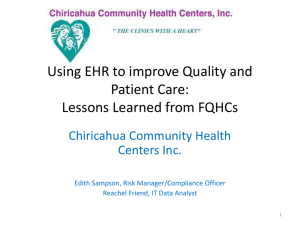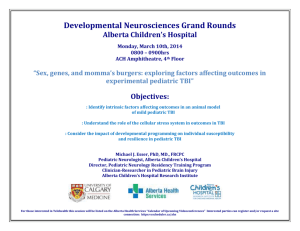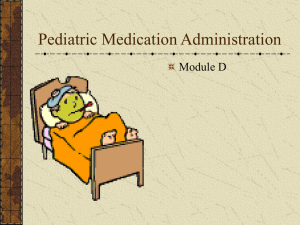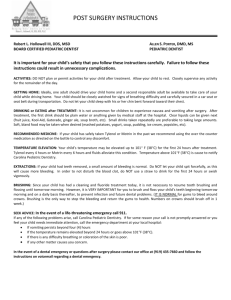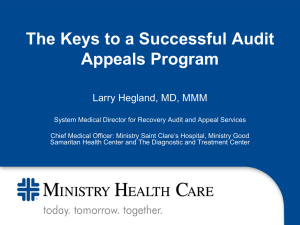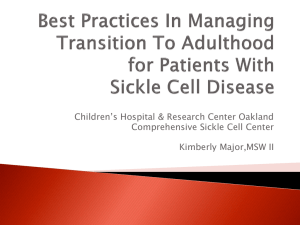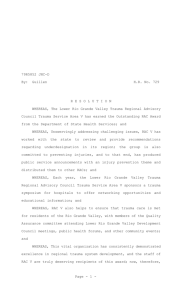Governor`s EMS and Trauma Advisory Council
advertisement
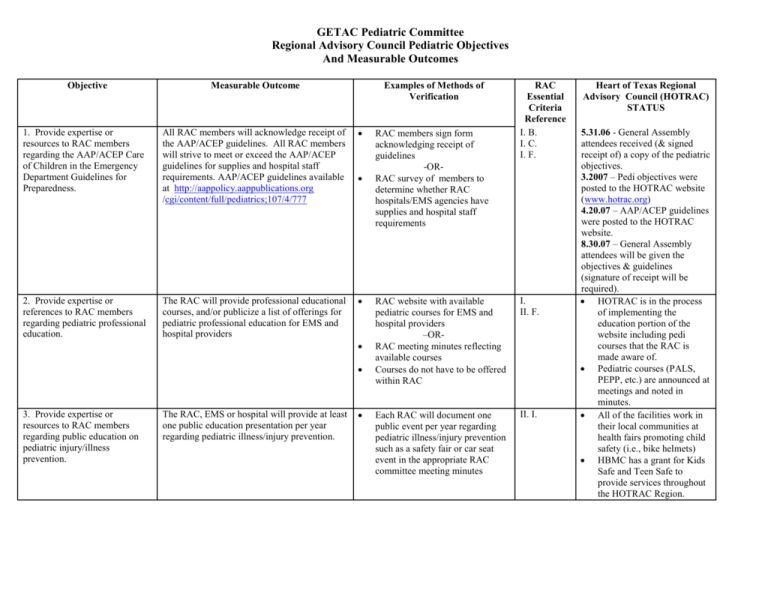
GETAC Pediatric Committee Regional Advisory Council Pediatric Objectives And Measurable Outcomes Objective Measurable Outcome Examples of Methods of Verification 1. Provide expertise or resources to RAC members regarding the AAP/ACEP Care of Children in the Emergency Department Guidelines for Preparedness. All RAC members will acknowledge receipt of the AAP/ACEP guidelines. All RAC members will strive to meet or exceed the AAP/ACEP guidelines for supplies and hospital staff requirements. AAP/ACEP guidelines available at http://aappolicy.aappublications.org /cgi/content/full/pediatrics;107/4/777 2. Provide expertise or references to RAC members regarding pediatric professional education. The RAC will provide professional educational courses, and/or publicize a list of offerings for pediatric professional education for EMS and hospital providers 3. Provide expertise or resources to RAC members regarding public education on pediatric injury/illness prevention. The RAC, EMS or hospital will provide at least one public education presentation per year regarding pediatric illness/injury prevention. RAC members sign form acknowledging receipt of guidelines -ORRAC survey of members to determine whether RAC hospitals/EMS agencies have supplies and hospital staff requirements RAC Essential Criteria Reference I. B. I. C. I. F. RAC website with available pediatric courses for EMS and hospital providers –ORRAC meeting minutes reflecting available courses Courses do not have to be offered within RAC I. II. F. Each RAC will document one public event per year regarding pediatric illness/injury prevention such as a safety fair or car seat event in the appropriate RAC committee meeting minutes II. I. Heart of Texas Regional Advisory Council (HOTRAC) STATUS 5.31.06 - General Assembly attendees received (& signed receipt of) a copy of the pediatric objectives. 3.2007 – Pedi objectives were posted to the HOTRAC website (www.hotrac.org) 4.20.07 – AAP/ACEP guidelines were posted to the HOTRAC website. 8.30.07 – General Assembly attendees will be given the objectives & guidelines (signature of receipt will be required). HOTRAC is in the process of implementing the education portion of the website including pedi courses that the RAC is made aware of. Pediatric courses (PALS, PEPP, etc.) are announced at meetings and noted in minutes. All of the facilities work in their local communities at health fairs promoting child safety (i.e., bike helmets) HBMC has a grant for Kids Safe and Teen Safe to provide services throughout the HOTRAC Region. 4. Provide expertise or resources regarding the need for child trauma death review. All counties in each RAC will have a mechanism to review all child trauma fatalities. A formal Child Fatality Review Team (CFRT) will review all child trauma fatalities, -ORReviews may be completed by the individual hospital’s Performance Improvement process, -ORReviews may be performed by the RAC’s Performance Improvement Committee Verification of a process for child trauma fatality review will be documented in the appropriate RAC committee meeting minutes II.H. Documentation of discussion and/or distribution of pediatric literature/resources in the appropriate RAC committee meeting minutes. Resources may be listed on RAC website or distributed at RAC meetings. I.B. I.C. II.D.2 II.F. Provide RAC members with a list of accepted pediatric resources: EMS-C, Safe Kids, and AAP. Provide RAC members with updated literature and supplies to prepare providers for caring for the ill and injured child, in both conventional and disaster situations. 6. Make recommendations to the RAC members regarding the definition of the pediatric patient. Each RAC should establish pediatric age guidelines for all EMS agencies. This will establish patterns of appropriate transport and transfer of the pediatric patient to the most appropriate facility in the region. It is desired that each RAC will have a documented standardized age for transport and transfer of pediatric patients. Documentation of discussion of a standardized age criteria will be documented in the appropriate RAC committee meeting minutes. I.C. 7. Establish performance improvement standards for the care of children in the prehospital and hospital settings. All RAC’s will utilize specific pediatric performance standards to assess opportunities for improvement in pediatric care. Each RAC will have documented pediatric performance improvement indicators as evidenced by documentation in the appropriate RAC committee minutes II.H. 5. Recommend resources for RAC members regarding pediatric issues. McLennan County currently has the only active CFRT in the Region. March 2007 – HOTRAC contacted county judges about establishing a regional CFRT. All the judges agreed. 3.26.07 – HOTRAC met w/ McLennan CFRT leader. Working out how the 2 teams can function together or work as one team. McLennan CFRT will discuss at their April 2007 meeting. Pediatrics is discussed at each committee meeting: Pre-hospital, Hospital Care & Management, Emergency Preparedness & Response, Physicians’ Advisory, Board of Directors, and General Assembly. HOTRAC will work to ensure pediatric resources are available on the website. 3.1.07 – HOTRAC General Assembly established that the pediatric age for the HOTRAC Region would be all patients 17 years old and under. 3.26.07 – Pediatric Committee established a Pedi QI Subcommittee (SC). 4.17.07 – 1st time SC met to begin discussion on a pedi QI process for facilities, EMS, and the Region. 8. Each RAC will have a resource to address issues related to children’s healthcare needs. A stand alone Pediatric Committee is preferred, but in absence of a Pediatric Committee, each RAC will develop a method to address pediatric issues. Draft from State 5.3.06 HOTRAC update 4.20.07 Each RAC will have a Pediatric Committee with documented meeting minutes, -ORA designated pediatric champion within each RAC committee will be documented in each RAC committee meeting minutes. If a RAC does not have a designated pediatric resource, they may obtain a resource in another RAC to act as a liaison regarding pediatric issues. The liaison and pediatric issues must be documented in the appropriate committee of the RAC. I.A.4 Dec 2006 – Pediatric Task Force was established. 2.12.07 – A formal chair was elected. Dr. Raj Gandhi accepted as pedi trauma champion and Dr. William Ferguson accepted as pedi medical champion. 3.1.07 – Pediatric Task Force was changed to a formal standing committee of the RAC in the bylaws. The Pedi Committee meets the 4th Monday of each month.

